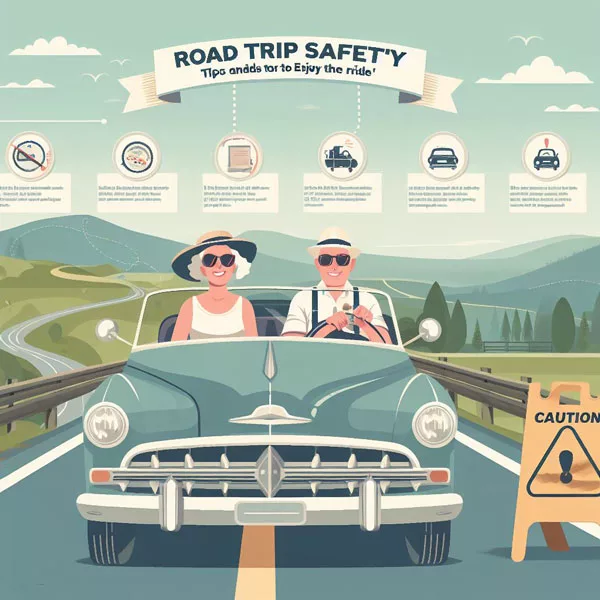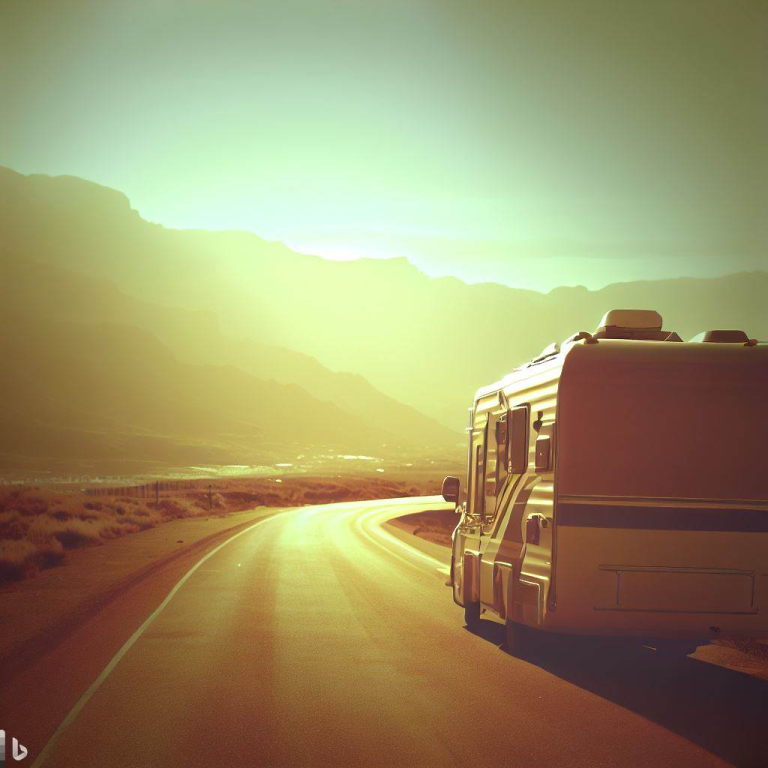The Retiree’s Guide to Road Trip Safety: Traveling with Confidence and Fun
Table of Contents
Introduction
Picture this: you’ve retired, you have a trusty vehicle, and the open road beckons. It’s the perfect setup for an epic road trip, right?
But before you start channeling your inner Kerouac, remember that the best road trips are safe road trips. As retirees, we might have a few more miles on our odometers, but that just means we know the value of a well-prepared journey.
So, buckle up and let’s delve into the art of road trip safety, peppered with a pinch of humor and a whole lot of practical advice.
Planning Your Road Trip: Safety First!
Planning is the unsung hero of a successful road trip. It starts with ensuring your vehicle is as ready for adventure as you are.
Check your car’s vital signs – the oil, tires, brakes, and batteries. Plan your route, considering rest stops and scenic points along the way.
Remember, a good plan is like a good travel companion – it makes the journey smoother and a lot more enjoyable.
The Ultimate Road Trip Safety Checklist
A road trip safety checklist is like a treasure map; it leads to a journey where the real treasure is coming back home with a bundle of happy memories. Your checklist should include:
- Vehicle Maintenance: Ensure everything, from headlights to windshield wipers, is in tip-top shape.
- Emergency Kit: Pack a kit with essentials like a first aid kit, flashlight, blankets, and some basic tools.
- Important Documents: Keep your driver’s license, registration, insurance info, and roadside assistance details handy.
Road Trip Tips for a Smooth Ride
Retirees know that comfort is king, especially on long drives. Make sure your seat position supports your back, and take frequent breaks to stretch your legs.
Keep hydrated (but not too hydrated – nobody likes frequent bathroom stops), and have healthy snacks within arm’s reach. The goal is to arrive at your destination with as much energy as when you started.
Navigating Highways Safely
Highway driving is a different beast, but one you can tame with a few key tips:
- Stay Alert: Keep your eyes on the road and hands on the wheel. Avoid distractions like fiddling with the radio or, heaven forbid, texting.
- Mind Your Speed: Stick to the speed limit. Speeding might get you there faster, but safety always takes the front seat.
- Know Your Route: Familiarize yourself with the route in advance, so you’re not caught off guard by unexpected turns or exits.
Driving Safety Tips: Keeping Alert and Safe
Borrowing tips from the corporate world, here’s how to stay sharp behind the wheel:
- Take Regular Breaks: Every couple of hours, pull over and take a break. It keeps the blood flowing and the mind sharp.
- Stay Hydrated: Dehydration can lead to fatigue, so keep water close – but not too much, or you’ll be stopping every 30 minutes!
- Share the Driving: If you’re traveling with a partner, share the driving load. It’s safer and more fun when it’s a team effort.
General Travel Safety Tips for Road Trippers
General travel safety is about being prepared for the unexpected:
- Check the Weather: Know what Mother Nature has in store, so you’re not caught in a storm unprepared.
- Keep Emergency Contacts: Have a list of emergency contacts, including family members and roadside assistance.
- Stay Informed: Keep abreast of any travel advisories or road closures along your route.
Staying Safe on the Road in 2023: What’s New
In 2023, road trip safety has gone high-tech:
- Use Safety Apps: Leverage apps for real-time traffic updates, weather forecasts, and emergency services.
- GPS Tracking: Use a GPS tracker to keep family informed of your whereabouts – it’s like a “find my friends” for the road.
Summer Driving: Beat the Heat and Stay Safe
Summer road trips are a classic, but they come with their own set of challenges:
- Avoid Overheating: Ensure your car’s cooling system is working properly to avoid overheating.
- Sun Protection: Use sunscreens and wear sunglasses. Just because you’re in a car doesn’t mean the sun can’t find you!
- Stay Cool: Keep the car’s interior cool and comfortable to avoid fatigue caused by excessive heat.
Conclusion
In conclusion, embarking on a road trip in your retirement years is not just about the destinations you explore, but also about the journey you embark on.
With the right preparation, a keen sense of awareness, and a touch of humor to keep things light, the road can be your oyster.
Remember, safety on a road trip is like the perfect travel companion – it makes the experience more enjoyable and worry-free.
So go ahead, chart your course, pack your essentials, and set out on the open road with confidence and a spirit of adventure. Here’s to the many miles and smiles that await you!
Frequently Asked Questions
What Should I Do to Prepare My Car for a Long Road Trip?
Before heading out, it’s crucial to perform a thorough check of your vehicle. This includes checking tire pressure, oil levels, brakes, headlights, and ensuring your spare tire is in good condition. It might also be wise to have a professional mechanic give your car a once-over.
How Often Should I Take Breaks During a Road Trip?
It’s recommended to take a break every two hours or 100 miles. Stretch your legs, get some fresh air, and hydrate. Frequent breaks help maintain alertness and reduce the risk of fatigue-related accidents.
What Are Essential Items to Include in a Road Trip Safety Kit?
Your road trip safety kit should include a first aid kit, flashlight, extra batteries, a multi-tool, emergency flares or reflective triangles, a portable phone charger, water, and non-perishable snacks.
How Can I Stay Alert and Focused While Driving Long Distances?
To stay alert, ensure you get a good night’s sleep before the trip. Keep the vehicle’s interior cool, listen to engaging music or audiobooks, and if possible, share the driving responsibility with someone else.
Are There Any Specific Safety Tips for Driving in Unfamiliar Areas?
When driving in unfamiliar areas, always keep your GPS or map handy. Stay on well-traveled and well-lit roads, especially at night, and be aware of local traffic laws and speed limits.
What Should I Do if I Encounter Severe Weather While on a Road Trip?
If you encounter severe weather, like heavy rain or a storm, slow down, keep your headlights on, and maintain a safe distance from other vehicles. If the weather becomes too intense, find a safe place to pull over until conditions improve.
Is It Safe to Drive at Night During a Road Trip?
While driving at night can be safe, it does come with increased risks like reduced visibility and driver fatigue. If you must drive at night, take extra precautions, ensure your headlights and taillights are working correctly, and take more frequent breaks.
What Dietary Considerations Should I Keep in Mind While on a Road Trip?
Opt for light meals and snacks that are low in sugar and high in protein to maintain energy levels. Avoid heavy meals that can lead to drowsiness. Stay hydrated, but balance your fluid intake to minimize excessive bathroom breaks.
How Can I Ensure My Personal Safety at Rest Stops?
At rest stops, park in well-lit areas, be aware of your surroundings, and keep your valuables out of sight. Avoid stopping in isolated areas, especially at night, and always lock your doors when you leave your vehicle.
What Are Some Tips for Eco-Friendly Road Tripping?
To make your road trip more eco-friendly, pack reusable water bottles and food containers, carpool if possible, stick to the speed limit to conserve fuel, and dispose of all waste properly.
Can I Rely Solely on GPS Navigation, or Should I Have a Physical Map as Well?
While GPS is incredibly useful, it’s wise to have a physical map or printed directions as a backup in case of technical issues or areas with poor signal reception.
How Do I Handle Roadside Emergencies?
In case of a roadside emergency, pull over safely, turn on your hazard lights, and use emergency flares or triangles if needed. If you have roadside assistance, call for help. Stay with your vehicle unless it’s unsafe to do so.
Are There Specific Road Trip Considerations for Pet Owners?
If traveling with pets, ensure they are secured in the vehicle, either in a crate or with a seatbelt harness. Bring enough food, water, and supplies for them, and plan for frequent stops to let them stretch and relieve themselves.
What Should I Know About Towing a Trailer or Caravan?
When towing, make sure your vehicle is capable of handling the extra load. Practice driving with the trailer or caravan before your trip, and be aware of the increased stopping distance and wider turns required.
How Can I Maintain Healthy Eating Habits on the Road?
Plan and pack healthy snacks like fruits, nuts, and yogurt. Choose restaurants that offer healthy options, and try to maintain a regular eating schedule to avoid overeating or excessive snacking.




